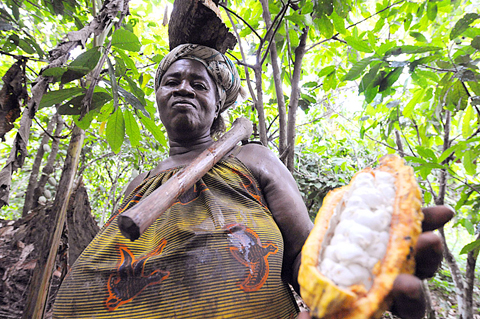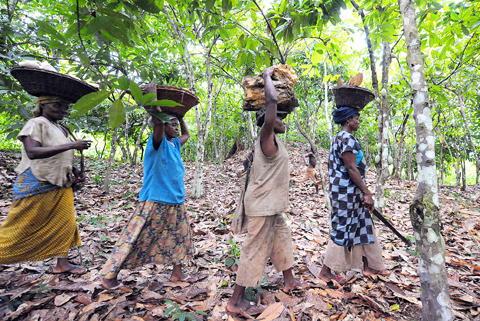Once it was the exclusive preserve of men but not any more: hundreds of women in Ivory Coast are ignoring patriarchal tradition and turning to the growing of cocoa.
Agathe Vanie, who founded an association of women growers in her village of Boko, said the reason was simple: “the misery of women in the face of the financial wealth of the men who own cocoa plantations.”
The association at Boko, which lies about 200km west of the capital Abidjan in the southern forest district of Divo, has grown to about 1,000 members since it was founded in 2005. It is the first — and thought to be the only one — of its kind in this west African country, finances its own costs and receives no state subsidies.

PHOTO: AFP
“Women cannot inherit or even create a cocoa plantation under our patriarch-dominated tradition,” said Vanie, criticizing what she called a “backwards and misogynist” practice.
“We decided, whatever it took, to … allow them to have plots of land,” said Vanie, whose country is the world’s largest producer and exporter of cocoa, accounting for more than 40 percent of the world’s cocoa production.
“I meet village chiefs and I explain to them that women can make a contribution to expenses that are increasingly heavy because of the cost of living and the price of food,” she said. “To begin with the reply was brutal and final: ‘No! A woman does not have the right to own a plantation and later give us orders.’”

PHOTO: AFP
But Clementine Galo, in her 70s, managed to become a woman cocoa planter and is happy today to have been one of those who took up the challenge.
“I was abandoned by my husband and I have only the plantation to meet my needs and prepare for my final days,” she said, standing by her trees, spread over two hectares, with their yellow pods of ripe beans.
Nearby, her friend Henriette Gneza proudly showed off her 20 hectares.
Last year she harvested 10 tonnes of beans and with the income paid school fees for her two children.
She could do even better this year, with prices of beans expected to rise.
The association also seeks to organize women into cooperatives to win new recruits to look after aging plantations.
But it has been an uphill battle in a country of 20 million where despite women’s increasingly active role in society, men still tend to make the decisions, head families and settle arguments.
“This activity gives them financial independence and lets them fight poverty in rural areas,” said Antoine Anon Dokou, a member of the association.
A report from the United Nations Development Program found that the poverty level in Ivory Coast reached 43 percent of the population last year, three or four points up on the figure in 2002 when civil strife split the country.
Women in the countryside are often the hardest-hit.
Vanie’s association wants to see her initiative copied and would like to launch a federation of women coffee and cocoa producers.
“Women have overcome their fear of men and difficulties in getting credit,” association treasurer Veronique Gopo said. “We are going out to win over our sisters in other regions.”
“We talk about ... the emancipation of women,” said Boko village chief Pierre Gbaza Zohouri, who backs the project. “In town you share household costs. Why not in the village?”
“They have my blessing,” he added with a hint of resignation.

MORE VISITORS: The Tourism Administration said that it is seeing positive prospects in its efforts to expand the tourism market in North America and Europe Taiwan has been ranked as the cheapest place in the world to travel to this year, based on a list recommended by NerdWallet. The San Francisco-based personal finance company said that Taiwan topped the list of 16 nations it chose for budget travelers because US tourists do not need visas and travelers can easily have a good meal for less than US$10. A bus ride in Taipei costs just under US$0.50, while subway rides start at US$0.60, the firm said, adding that public transportation in Taiwan is easy to navigate. The firm also called Taiwan a “food lover’s paradise,” citing inexpensive breakfast stalls

TRADE: A mandatory declaration of origin for manufactured goods bound for the US is to take effect on May 7 to block China from exploiting Taiwan’s trade channels All products manufactured in Taiwan and exported to the US must include a signed declaration of origin starting on May 7, the Bureau of Foreign Trade announced yesterday. US President Donald Trump on April 2 imposed a 32 percent tariff on imports from Taiwan, but one week later announced a 90-day pause on its implementation. However, a universal 10 percent tariff was immediately applied to most imports from around the world. On April 12, the Trump administration further exempted computers, smartphones and semiconductors from the new tariffs. In response, President William Lai’s (賴清德) administration has introduced a series of countermeasures to support affected

CROSS-STRAIT: The vast majority of Taiwanese support maintaining the ‘status quo,’ while concern is rising about Beijing’s influence operations More than eight out of 10 Taiwanese reject Beijing’s “one country, two systems” framework for cross-strait relations, according to a survey released by the Mainland Affairs Council (MAC) on Thursday. The MAC’s latest quarterly survey found that 84.4 percent of respondents opposed Beijing’s “one country, two systems” formula for handling cross-strait relations — a figure consistent with past polling. Over the past three years, opposition to the framework has remained high, ranging from a low of 83.6 percent in April 2023 to a peak of 89.6 percent in April last year. In the most recent poll, 82.5 percent also rejected China’s

PLUGGING HOLES: The amendments would bring the legislation in line with systems found in other countries such as Japan and the US, Legislator Chen Kuan-ting said Democratic Progressive Party (DPP) Legislator Chen Kuan-ting (陳冠廷) has proposed amending national security legislation amid a spate of espionage cases. Potential gaps in security vetting procedures for personnel with access to sensitive information prompted him to propose the amendments, which would introduce changes to Article 14 of the Classified National Security Information Protection Act (國家機密保護法), Chen said yesterday. The proposal, which aims to enhance interagency vetting procedures and reduce the risk of classified information leaks, would establish a comprehensive security clearance system in Taiwan, he said. The amendment would require character and loyalty checks for civil servants and intelligence personnel prior to